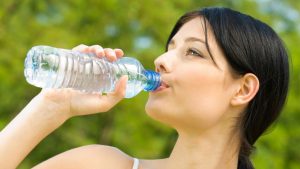Prevention of dehydration
Dehydration occurs when the body has lost too many fluids and electrolytes, i.e. potassium and sodium salts. Fluids and electrolytes lost during diarrhea must be replaced immediately, as the body cannot function properly without them. Dehydration is especially dangerous for children, as it can cause death within a few days.
Although water is extremely important to prevent dehydration, it does not contain electrolytes. To maintain electrolyte levels, you can consume broth or soups that contain sodium and fruit juices, soft fruits or vegetables that contain potassium.
For children, doctors often recommend a special hydration solution containing the nutrients they need.
Useful dietary tips
Until the diarrhea subsides, try to avoid dairy products and foods that are fatty, high in fiber or too sweet. These foods tend to make diarrhea worse. As the condition improves, you can add soft foods to your diet, such as bananas, plain rice, boiled potatoes, breadcrumbs, crackers, cooked carrots and roast chicken without the skin or fat. For children, the pediatrician may recommend the so-called BRAT diet: bananas, rice, apple and toast.
How to prevent travelers’ diarrhea
Travelers’ diarrhea is caused when you consume food or water contaminated with bacteria, viruses or parasites.
You can take the following precautions when you go abroad to prevent travelers’ diarrhea. More specifically:
- Do not drink tap water, even when brushing your teeth.
- Do not drink unpasteurized milk or dairy products.
- Do not use ice from tap water.
- Avoid all raw fruits and vegetables, including lettuce and fruit salad, unless you can peel them yourself.
- Do not eat raw or undercooked meat and fish.
- Do not eat meat or shellfish that is not hot when served to you.
- Do not eat food from street vendors.
You can safely drink bottled water if you are the first to open the bottle, as well as carbonated soft drinks and beverages such as coffee or tea.
Depending on your travel destination and the length of your stay there, your doctor may recommend taking antibiotics before you leave to protect you from possible infection.
Conclusions – What to remember
Diarrhea is a common problem that usually goes away on its own.
It becomes dangerous if a person becomes dehydrated.
Causes of diarrhea include: viruses, bacteria or parasitic infections, food intolerance, reactions to medications, intestinal diseases and functional bowel disorders.
Treatment for diarrhea involves restoring lost fluids and electrolytes. Depending on the cause of the problem, medication may be needed to stop the diarrhea or to treat an infection. Children may need a hydration drink to replace the fluid and electrolyte loss.
Call the doctor if a person with severe diarrhea has pain in the abdomen or rectum, a fever of 38.88 degrees Celsius or higher, blood in the stool, signs of dehydration, or diarrhea for more than 3 days.

